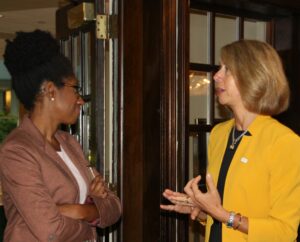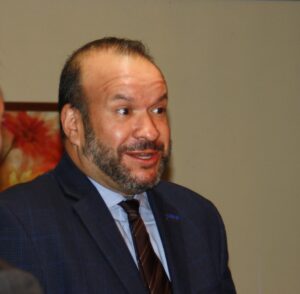A severe shortage of skilled labor makes apprenticeships an ideal way for businesses to fill the gap. At least in theory. The reality, however, is that apprenticeships are hard: They take time, money and commitment that many employers don’t think they can afford.
The Murphy administration is trying to change that. The governor has directed his labor, education and higher education cabinet officials to develop a network that would allow businesses to contact one person in the state and get the assistance they need to establish a registered apprenticeship program. On Wednesday, those three cabinet officials met with about 50 NJBIA members to discuss how they are going about it.
“I’m not going to lie; it’s not easy being involved in an apprenticeship program,” said Robert Asaro-Angelo, commissioner of the Department of Labor and Workforce Development (LWD). “But I feel like every day, when I talk to businesses, they’re all-in on this.”
Join us Sept. 28 for Meet the Decision Makers – Department of Labor
Gov. Phil Murphy called it the New Jersey Apprenticeship Network when he announced the initiative in the spring. At a joint meeting of NJBIA’s Employment and Labor, and Education and Workforce Development Policy Committees, Asaro-Angelo was joined by Commissioner of Education Dr. Lamont Repollet and Secretary of Higher Education Dr. Zakiya Smith Ellis to start laying out what the network will look like.
A key component of Murphy’s plan is for education and labor to work together in preparing students for what comes after high school or college; in other words, making sure graduates are ready for the working world.
It’s a mission Repollet has embraced.
“Historically, when we developed education and came up with a system, the goal was to support industry,” Repollet said. “Our core has always been to support the work that we do in the regular workforce. But over the years, we’ve kind of gotten away from that.”
The new vision supplements classroom learning with work experience, like apprenticeships, to help teach kids about soft skills—punctuality, dress, decorum, etc.—so they are ready when they hit the workforce.
“That starts right now, just exposing kids to the business world, teaching them soft skills, making sure that when they get to you, the employer, they’re ready,” Repollet said.
Ellis is taking a similar approach in higher education.
Ellis thinks of her role as one supporting post-secondary education, which encompasses everything after high school. That does not mean everyone has to get a four-year bachelor’s degree, but they do need some sort of credential. In fact, at least half of the workers do not have a bachelor’s degree. But more people do need some sort of post-secondary education credentials—a certificate, an associate’s degree, or an apprenticeship.
“You need to have something to show what you know and what you’re able to do,” Ellis said. “It has to be something that says I know something about something.”
“We appreciate the cabinet officials participating in our Joint Policy Committee Meeting today and look forward to working with the Apprenticeship Network to expand apprenticeships in our state,” said Mike Wallace, vice president Government Affairs. “In order for this initiative to work all stakeholders must be engaged and involved. There was representation from all the key stakeholder groups at our meeting today. This is a positive sign for what we hope lies ahead.”




